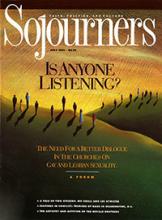The subject of this special issue of Sojourners drives me back to God -- that is, God as the creator, preserver, and sustainer of our lives. Homosexuality is not a compelling issue for me; it is far too abstract a term. But how we treat each other and, in this case, gay people, necessitates that I plumb the depths of my understanding of God.
My existence as a person, sometimes civil and human rights activist and longtime professor of pastoral theology, has been framed by a commitment to, concern for, and solidarity with my sister and brother inhabitants of this planet, especially the downtrodden, the oppressed, and the forgotten. This attempt to be a responsible citizen of the world community is based upon the biblical assertion that "God has made of one blood all the nations to dwell upon the face of the earth." It is further undergirded by the metaphorical, yet deeply meaningful, word that humankind is made in the very image and likeness of God.
During the early years of the AIDS epidemic, some Christian ministers viewed the disease as God's punishment of gay males because of their "sinful" behavior. There continues to be in our society, despite efforts toward education and broader understanding, a deep-seated homophobia fueled by those who fear and are insecure about their own sexuality, purported biblical condemnation, and a general ambivalence and schizophrenia about sexuality in the culture.
There is a current tendency to appropriate those biblical verses that appear to support our own individual or group prejudices, enmities, and fears. How easy it is to assign others and especially "the other" to the fiery flames of hell, while preserving our own special seats in the blissful precincts of heaven.
Read the Full Article

